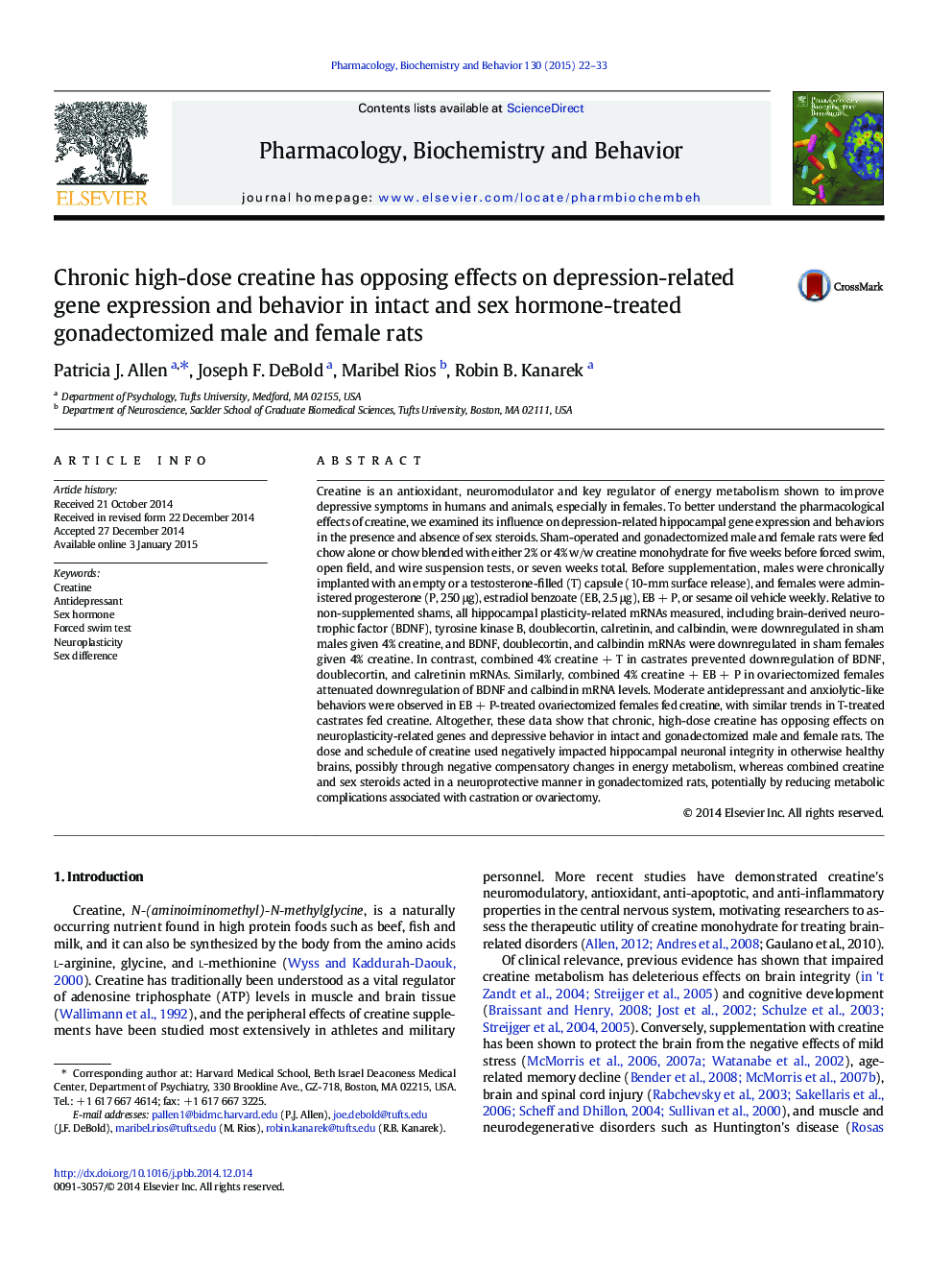| کد مقاله | کد نشریه | سال انتشار | مقاله انگلیسی | نسخه تمام متن |
|---|---|---|---|---|
| 8350741 | 1541854 | 2015 | 12 صفحه PDF | دانلود رایگان |
عنوان انگلیسی مقاله ISI
Chronic high-dose creatine has opposing effects on depression-related gene expression and behavior in intact and sex hormone-treated gonadectomized male and female rats
ترجمه فارسی عنوان
کراتین مزمن کراتین با دوز بالا دارای اثرات مخالف در بیان ژن مربوط به افسردگی و رفتار در موش های صحرایی نر و ماده،
دانلود مقاله + سفارش ترجمه
دانلود مقاله ISI انگلیسی
رایگان برای ایرانیان
کلمات کلیدی
کراتین ضد افسردگی، هورمون جنسی، آزمایش شناور اجباری، نوروپلاستی، تفاوت جنسی،
موضوعات مرتبط
علوم زیستی و بیوفناوری
بیوشیمی، ژنتیک و زیست شناسی مولکولی
زیست شیمی
چکیده انگلیسی
Creatine is an antioxidant, neuromodulator and key regulator of energy metabolism shown to improve depressive symptoms in humans and animals, especially in females. To better understand the pharmacological effects of creatine, we examined its influence on depression-related hippocampal gene expression and behaviors in the presence and absence of sex steroids. Sham-operated and gonadectomized male and female rats were fed chow alone or chow blended with either 2% or 4% w/w creatine monohydrate for five weeks before forced swim, open field, and wire suspension tests, or seven weeks total. Before supplementation, males were chronically implanted with an empty or a testosterone-filled (T) capsule (10-mm surface release), and females were administered progesterone (P, 250 μg), estradiol benzoate (EB, 2.5 μg), EB + P, or sesame oil vehicle weekly. Relative to non-supplemented shams, all hippocampal plasticity-related mRNAs measured, including brain-derived neurotrophic factor (BDNF), tyrosine kinase B, doublecortin, calretinin, and calbindin, were downregulated in sham males given 4% creatine, and BDNF, doublecortin, and calbindin mRNAs were downregulated in sham females given 4% creatine. In contrast, combined 4% creatine + T in castrates prevented downregulation of BDNF, doublecortin, and calretinin mRNAs. Similarly, combined 4% creatine + EB + P in ovariectomized females attenuated downregulation of BDNF and calbindin mRNA levels. Moderate antidepressant and anxiolytic-like behaviors were observed in EB + P-treated ovariectomized females fed creatine, with similar trends in T-treated castrates fed creatine. Altogether, these data show that chronic, high-dose creatine has opposing effects on neuroplasticity-related genes and depressive behavior in intact and gonadectomized male and female rats. The dose and schedule of creatine used negatively impacted hippocampal neuronal integrity in otherwise healthy brains, possibly through negative compensatory changes in energy metabolism, whereas combined creatine and sex steroids acted in a neuroprotective manner in gonadectomized rats, potentially by reducing metabolic complications associated with castration or ovariectomy.
ناشر
Database: Elsevier - ScienceDirect (ساینس دایرکت)
Journal: Pharmacology Biochemistry and Behavior - Volume 130, March 2015, Pages 22-33
Journal: Pharmacology Biochemistry and Behavior - Volume 130, March 2015, Pages 22-33
نویسندگان
Patricia J. Allen, Joseph F. DeBold, Maribel Rios, Robin B. Kanarek,
